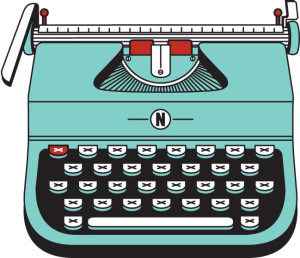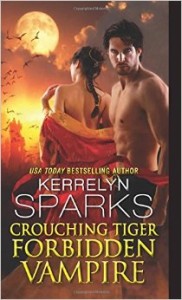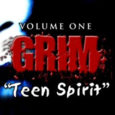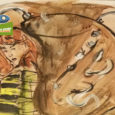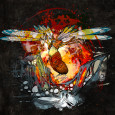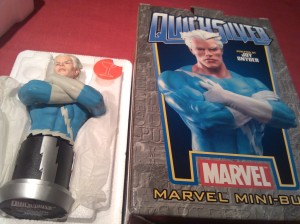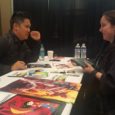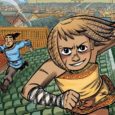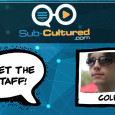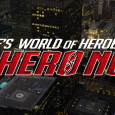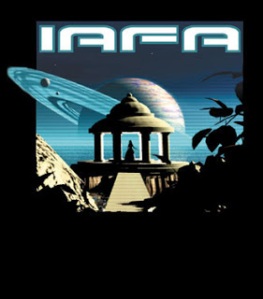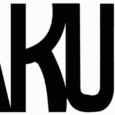For those who are unfamiliar, National Novel Writing Month is an annual online challenge for aspiring writers to complete a first draft of a short novel (50,000 words) during the month of November. The goal is to get people writing, foster creative thinking, output, as well as jumpstarting possible careers through the completion of rough first drafts writers can later revisit and expand on. If you’re already a writer and a yearly participator, then you’re probably well on your way towards your goal, and if you’re not, that’s okay too. Whether you’re reaching the pivotal moment where your character learns their true power or still struggling with that first twist, or hey even a name for your lead, we have a list of practice writing exercises and prompts to get your gears going for the day!
As you sit down to write for the day, choose one prompt or exercise and using it as your base, write for 15-30 minutes as a warm-up. You can use your current characters to help build their personalities for your main NaNo text, or jump in and create something new. You might be surprised by what you can make.
- Have a character be caught doing an activity or saying something atypical to their established personality and or interests. Have them then justify why they are doing what they are doing or why they said it.
- She walked into the room, closing her emerald colored umbrella.
- Pythons had nothing on this.
- These trees, naturally, were very good at killing people.
- “Put that down, it could rip your arm off.”
- The truth hung heavy on her wrist.
- By the time it cooled, we were ready.
- Have character reveal a secret to another character or to the reader.
- Parlez-vous français? Does your character speak another language? Have them have to use it.
- “Just carrying that in made you annoyed?”
- The face that broke her was one seldom seen.
- He chewed through the marshmallow, furious.
- They were there after all.
- “It’s not safe here,” she said, “meet me by the café at 11. Listen for the whistle.”
- Playing croquet was supposed to be boring, but the appearance of a lone ringed finger on the court made everything hysterical.
- He thought he was alone, until he heard an owl screech by the train car window.
- Eris Interrupting a Party: Have an obstacle, object or persion that everyone in one room wants for themselves or must overcome appear or occur in a room of your characters. How does each person try to get what they want?
- Luck was not a factor here.
- If it wasn’t for the jeweled dagger stuck through my hand, I would have laughed too.
- Make your character fiddle with an object while they think/speak.
Happy writing!
Max Eber
Staff Writer
@maxlikescomics
Are you a writer? If you are, then you’ve probably written a book or something. Something probably pretty amazing. Or maybe really bad but hey, trust me it will get there. Hint: Kill them. It will work so much better. Or throw in knitting motifs. Everyone loves knitting. Put in both and you’re guaranteed Greatest Gen and Baby Boomer readership.
Whether if it’s ready to go or on its 5,000 edit, there is the possibility that said future award winning oeuvre is still lacking a title. And that fact is really turning into a problem. Believe me, we’ve been there. You just can’t name the thing. It bothers you, waking you up at night and while you pee. It’s painful. However, you should be relieved to know it is quite a common condition, one you should never be ashamed of. We’re here today ready to help.
How can you find the best title for your piece? Luckily there are many routes you can take for optimum shelf appeal and cash grab-ability (hotcha). Locations are always a hit, especially if you’re going for beach-house chic (e.g. Lush Lagoon). A most practical method is pulling from a key line of description (e.g. Peacock Eyelids or Civet Perfume). You can also try pulling from a piece of dialogue ( e.g. I Knew Him More Than A Reflection). For panache you could do the main character’s name plus something, an object or action relating to them in the piece (e.g. Janelle’s Swim, Bartleby’s Stethoscope, Anna’s Wooden Clogs). As always, an abstraction of what happens in the narrative
is usually effective and intriguing (e.g. Slinky Kinky Aspirations). There’s also the route of using an obscure jazz song or movie titles that may thematically fit (e.g. Solid Potato Salad, Gone With The Febreeze). Of course no one can resist the one word heavyweight (e.g. Malformation)
For those title-less writers in need who’d rather not think, we have done a lot of exhaustive research (like a whole…thirty minutes worth) and pulled from library circulation experience to compile a list of 100 surefire “Best Seller” book titles tailor-made for you and your work. Will it have anything to do with what you’ve written? Probably not, but man will it be snazzy looking.For those who are writers but are currently manuscript-less, don’t feel anxious that this list won’t be helpful to you, feel free to use these titles as inspiration for your own work. We want to see all of these on our library shelves.
*Disclaimer: This list is purely for comedy purposes and any book or text already in publication that carries these names, congratulations you’re amazing, brilliant and we don’t mean to besmirch your work. Our use of your work’s title is purely coincidental. Let’s get snowballs.
100 TITLES FOR YOU:
Kitten Needles
The Heir’s Hairdresser
Okay, So
Smoking During Surgery
Man Smell
Funny You Should Mention Her
Vampire’s Benediction
Call and Order Now
Whelmed
Pepper Perfect
Gates to Olive
And Then What?
Tidal Sworn
Hot Griddles
Mind The Rebellion
A Cricket Cries For Naught
Obvious Suffering
Gelatin Wobbling
I Swore Up And Down
Felled Stairs
2 Lambbs 4 Tygas
Fortuna
Malice: The Return of Ayn Rand
Hot Sauce Haughty
Paradise Lemons
Anxious Iago
Paul Newman Blue
Technobabble
Did You Just Drink That?
Sage Among Roses
The Movie Version Will Be Rated R
Marian’s Comb
Be My Editor
When Cacti Wither
Why Aren’t I Billie Piper?
Why Hasn’t Hayley Atwell Noticed Me? (The Sequel)
They Uttered Nyah
Only Orion Left
19 Lawsuits & Counting
Sempervivum
Mary Higgins Clark On The Run
Clockwork Sister and Sun
Hippolyta In Kokomo
In Another’s Agony
Nourish
Depression-Pasillo
Antigone: That Bitch Won’t Quit, And Other Greek Plays
A Wanna Hat With Cherries
They Asked Me To
I Hope You Didn’t Invest Too Much In Him
Plastic Bag Picnic
Chicken Church
Sophia Loren Would Love Me
What Lilliputian’s Wore
Vases, Spilled
Sticky Melon Water
Stop Yelling, Guy Fieri: My Summer on Food Network
I’m Dying (Not Really) And I Want To Go Home
Pineapple Weather
Like Eartha Kitt in Anna Lucasta
Playground of Justice
I’ve Chewed Too Much
Frog Chorus
Out of Avenues I’ve Been
I Saw It Somewhere (Probably Online)
Hypnos
An Affair In Progress
Soap Rings
Whatever, Ya Know?
A Book About Brunch
Grotesque Arches
I Am Gibraltar
Reading Jugend Alone
Where’s My Retcon?
The Wall Outlet
Goodbye To Cropped Front Pleat Trousers
How Do You Poop Catdog?
Something Topical
I Was A Teenage Cave Woman
Running From Britta
Cloven Hereafter
I’m All Chewed Up About It
Trash Manor
How To Find The Droids You’re Looking For: A Star Wars Self Help Book
A Blouse By Schiaparelli
Mulliganville
Wood
Elephant Waltz
An Undercut Like Superboy’s
An Alligator Zoetrope
Here! In the Wychwoods
You Better Strip Polka
Crime Show(off)
Sounds Like 80’s Synth
June, July, and August
Patterns of Pomegranates
I Wish I Was Donna Troy
Better Bitter Than Sorry
Wings Are From Buffalo, Buffalo, Buffalo
Pure Local Honey
Got any titles that would be absolutely stellar? Tweet them to me at twitter at @maxlikescomics #100BookTitles!
Max Eber
Staff Writer
max@sub-cultured.com
Can you hear the distant rumbling? The pitter patter of the happiest of feet? Can you see visions of plot bunnies and character deaths everywhere?
The most wonderful time of the year is upon us: the month of November, when thousands of novelists all over the world gather for thirty days and thirty (sleepless) nights of literary abandon. National Novel Writing Month, or NaNoWriMo, is, for many of us writer-by-night types, a fantastic excuse to pump out a 50,000 word novel in thirty days or less. This year will be my sixth taking part in an annual event that some may call crazy, and by now I’ve got the rhythm down. For those of you who may not, however, here are a few tips to NaNo success.
Prepare Early
Grated, I am perhaps the worst example of this as I put off getting this article out until today. I have, however, been preparing for NaNo throughout the month of October. There are two main kinds of writers in the NaNo world; plotters and pantsers. Plotters are self-explanatory–they plot out their novel or parts of their novel before November first even dares approach.
I am more of a pantser, myself–both in that I am the champion of pantsing people, and in that I come up with a general idea for my newest project, or a character, or a format I’d like to try out, and then see where it takes me. Plotters, however, may be more in to looking up storyboard templates or character design information, or diving into the depths of the NaNo forums. No matter what kind of writer you are, however, I highly recommend stocking up on provisions well before October 31st. I’ve been stockpiling cheez-its for weeks.
That Being Said…The Best Laid Plans…
See above. I started writing this article about two weeks ago, knowing it would take some time. Life got in the way, as it always does. But I’m determined to finish before my deadline (today, obviously)…so here I am. The whole point of NaNo is to stop making excuses, sit down at your computer or notebook or whatever, and write. This is the time of year when thousands of other people like you have committed to setting and then meeting a ridiculous goal. You can do it, even when the dog is throwing up and Thanksgiving dinner has to be made and you have work in the morning.
Know that things happen. Know that all the planning in the world can’t stop a hurricane from hitting, or a job crisis from landing smack in the middle of your “crunch” week. Stay ahead of your daily goal as much as you can, and maybe that crisis won’t be so bad.
Know Your Comfort Zone
I mean this in every way possible. I know my writing groove requires hot tea, comfortable pants, warmth, and some kind of music to which I don’t have to pay attention. I also know that I type fast and get discouraged easily. Having Cheez-its handy helps.
I am easily distracted, so sometimes removing myself from my house completely is a good idea, but I need to go somewhere I can spread out and get food and/or caffeine easily. I like using a writing program called Q10, which essentially turns my screen into a DOS word processor so all I can do is type or not type. It also makes typewriter noise, the monotony of which helps me focus a little. You should know what makes you comfortable, or what puts you into writing mode–both physically and mentally. You should also know if your comfort zone is acually the same as your productive zone, and be honest with yourself about it. Your bed is almost never a good place to get things done.
Set a Reasonable Goal
If you can’t make 50,000, then aim for 25. If 50 sounds a little low, aim for 75. Aim for ten pages a day or two or one. Aim for a short story a week if that’s your thing, or work on poems one at a time. This is a month to do what you’ve always wanted, not to set an arbitrary goal and then go for broke.
Personally, I like using November for novel writing. I don’t get a lot of time for long-form writing for the rest of the year, so that’s what I focus on come NaNo. And yes, it does have NOVEL right in the title, but if you poke around in the forums even just a little you’ll see plenty of people use it as an excuse to pursue other literary goals.
Know Your Most Productive Times
I’m productive after dark. I hate leaving everything to the weekends. I like working in short spurts and proving how much I can get done on lunch breaks or commercials.
You should know if mornings aren’t your thing. You should know if your brain shuts down after nine. Knowing when you’re productive will help avoid frustration. One year I was all “imma get up early and get all my writing done before work and school and I’ll be the coolest.”
I did not win that year.
Be Willing To Ask For Help
Writing groups are awesome. You can create a writing group out of like-minded friends, whether they are participants or not. You can find a local group in the forums, if you don’t have and real-life writer buddies. One of the great parts about NaNo is that just by participating, you’ve got a writing group of thousands of people at your fingertips. I’ve made several twitter friends through writing sprints (short writing times where you try to write as much as you can within a set time limit) just because we were constantly comparing numbers. We went on to create off-time challenges against one another to keep the writing flow going, and then kept in touch long after NaNo was over.
NaNo also has “municipal liaisons” which are basically leaders in specific areas. When you sign up for NaNoWriMo, you can add a region, and whichever region you add signs you up for emails from your ML. The best MLs organize write-ins where wrimos can meet up and write together IN PERSON.
Whether you ask for it in person or online, there’s no shame in admitting you’re stuck, or spitballing ideas, or scrapping your entire story board and starting from scratch based on an idea you jotted down at three in the morning.
And Finally, Have Fun!
Remember, no one is forcing you to write. No one is going to force you over the finish line, either. It’s going to be hard–if you want it to be. Personally I enjoy a challenge, and love carving out time in my schedule to write furiously. But not everyone is the same.
If you’re not having fun, really think about whether or not it’s time to change something in your NaNo schedule. If it’s too many words, or not enough, then pick another goal. Or maybe it’s just not your year. Out of the six years I’ve participated, I’ve only won three. One year school was too much. Another I was trying to write only when I had hours at a time. And finally, one year I just didn’t have a novel’s worth of material. There are all sorts of reasons not to cross the finish line, Make sure if you don’t make it there that it’s for a reason.
See you all next month, hopefully 50k words richer! Follow my progress at NaNoWriMo.org/jenisaurusrex
Image credit: Nanowrimo.org
Jen Schiller
Feature Writer
jenisaur@ihogeek.com
twitter.com/jenisaur
So here’s the thing.
Sometimes I get exhausted trying to figure out what to write and while I’m currently balls deep into Supernatural (just started season 2) so I can write about my spiraling fangirl addiction about that, I figured we can have some fun together!
I wanna say a good 25% of us are writers at heart or even just enjoy a good fanfiction read every now and then so I present you with this challenge and don’t worry, the best challenges come with a prize!! So here’s the deal: there is a prompt at the end of this and all you need to do is leave a comment incorporating the prompt’s elements into a mini story. I don’t care how long it is, I’ll read it. I don’t care what fandom it is or if it’s strictly original characters.
This will be open until Monday, May 6th 11:59 pm CST. This will only get the usual share on our Facebook page & Twitter. What do you win?
You’ll get your choice of either statue shipped to ya.
Good luck!!
PROMPT: It’s Fourth of July and your characters decide to pop some fireworks. One of them is wearing a Santa hat. Include the phrase “Two is better than one… plus, it’s more fun!”
Leia Calderon
@ladyvader99
ladyvader99@ihogeek.com
Nothing impedes a writer or journalist like finding oneself descending into writer’s block. Terrible. Awful. The. Words. Won’t. Budge. You can’t write a thing. Rubbish. Terrible. Nothing. Nope. Nope. Nada. Boring. Sheesh what even is that sentence. Oh god I hate this character. What even am I doing. How could I ever. Oh god what is this topic. No one wants to read that. What. Is. Awful. This. Writing.

Like dat clipart? Oh yeah kicking it old school. Photo from MixedDigital.com.
Really, how does one cure it? Well, I have seen many, many guides online and in books. Most contain lots of tips to kickstart your thinking; prompts, exercises, extensive or entirely specific journaling, intense faux-mystical breathing. In and out. In and out. Walk away, come back. Throw your laptop or typewriter (oh ho we’re really going old school, let me get my inkwell and pen) out the window, retrieve it and apologize thoroughly. Fifty intense mental push-ups, five games of finger football and then building an incense altar to the Muses or for some of you dear writers, more…lascivious gods. These guides hope that once one has completed said rituals (the above is paraphrased, the true rituals can last over 5 hours depending on which methods and books you choose), one’s writing ability is would be gloriously restored. Words return and flow. The Muses (from Hercules) now appeased appear and sing gospel in your ear. Plot rolls onwards and bends to your will. Characters die beautifully. Everything is right with the world!
Well, quite frankly all that is fine. That’s dandy stuff. Really it is. But for me, yes, for me, I find they all miss the biggest piece of advice and in my opinion perhaps the best thing to do when combating writer’s block. The secret to combating writer’s block? I give three key points:
1. Accept it and succumb.
2. Accept it and succumb.
3. Accept it and succumb.
Yes. That is the key. Accepting it is the best key. Yes. Let go of trying. Let go the want, and the need to write. Plot? Who cares. Character being a pain in the ass? Pft let them be. Article not writing itself (say what?), fine let it be awful or just go unwritten. Let the writer’s block seep around your ankles, let it rise and consume your legs, and up around your entire body. Laugh as deadlines tick closer and closer. Lie back and fall into the soft, rippling dark waters of writer’s block and complete inability. Yes. Let it all go.

I stopped caring and have reached the plane of blissful existence where people laugh with salad.
Once writer’s block has successfully, entirely pulled you under, filling your lungs and effectively drowning you, only then will one see the golden light of inspiration. I have died a literary death quite often in this manner, dragged down by a siren grip, only to be reborn with much better facilities. It’s always darkest before dawn and all that wonderful stuff. It’s like you are a literary phoenix, well if a phoenix was more like a fat little quail.

I…AM…PHOENIX!
So yes, dear writers out there if you are ever plagued with tied up words and limp noodle inspiration or incentive; throw out all those yoga and tantric breathing whilst journaling underwater for writers and… just embrace it and let it suffocate you, entirely.
Max Eber
Staff Writer/The Doctor
max@ihogeek.com
Twitter: @maxlikescomics
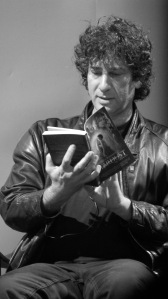 In case you haven’t noticed yet, fellow IHoGeek writer Max and I are working together on a super-awesome kick-ass paper about Doctor Who, Peter Pan, and the show’s growing popularity in America. We’ve titled our paper “Come Along Pond, Off to Neverland”, a title which starts to describe the relationship we’ve discovered between Peter and Wendy’s escape from reality, and Eleven and Amy’s similar escape. We also noticed that the parallel between the two coincided rather nicely with the explosion of Doctor Who’s popularity here in the states; even though it was definitely a cult classic in the 70s and 80s, it’s never been quite this mainstream. The project is so kick-ass that we’ve been invited to present it at this year’s International Conference for the Fantastic in the Arts, where the guest speaker will be the one and only Neil Gaiman!
In case you haven’t noticed yet, fellow IHoGeek writer Max and I are working together on a super-awesome kick-ass paper about Doctor Who, Peter Pan, and the show’s growing popularity in America. We’ve titled our paper “Come Along Pond, Off to Neverland”, a title which starts to describe the relationship we’ve discovered between Peter and Wendy’s escape from reality, and Eleven and Amy’s similar escape. We also noticed that the parallel between the two coincided rather nicely with the explosion of Doctor Who’s popularity here in the states; even though it was definitely a cult classic in the 70s and 80s, it’s never been quite this mainstream. The project is so kick-ass that we’ve been invited to present it at this year’s International Conference for the Fantastic in the Arts, where the guest speaker will be the one and only Neil Gaiman!
The conference will take place in Orlando, Florida which is not anywhere close to where either Max or I live…and we are poor recent-grads, so we started a kickstarter to support our academic goals! We have been posting like crazy everywhere–you may have seen the kickstarter on the IHoGeek twitter page and/or facebook, and a few weeks ago Max posted here on the blog about the paper topic. IHoGeek even officially supported us last week with a backer’s pledge of $10, for which we are eternally grateful.
We have officially supported @jenisaur and @maxlikescomics as they go to present their Doctor Who/Peter Pan at… fb.me/2d0UAOwIu
— IHOGeek (@IHOGeek) February 6, 2013
Today, in the last three days of our kickstarter campaign, I’m making a final push for backer support, and while I do, I’m going to encourage you all to be as awesome as we are.
I attended the conference last year, presenting on science fiction musicals, and had a blast. I made tons of professional connections and hope to do the same this year. Since our topic is a little more main-stream this year, we will be able to present in front of an even larger audience than I did last March, but I’m also REALLY looking forward to seeing other presenters’ material. You never know where inspiration lies! Here’s how to take your own ideas and share them with the academic world:
Step One: Have A Crazy Idea That Can Be Backed Up With Research
Both this year’s presentation and last’s started with mind whirrings. Last year I presented a paper I had written while working on my Masters Degree, about Science fiction and Broadway musicals. They shared a golden age, but didn’t come together successfully until the 1980s. That seemed weird to me, so I started researching and before I knew it I had a solid paper topic. This year the topic for our paper/presentation started with “have you noticed that there’s a lot of fairy tale stuff in the Smith years of Doctor Who?” At first Max and I just joked around about the links between Amy and Eleven and Wendy and Peter, but once we started thinking about it seriously, the connections made more and more sense. Then we started thinking about it even more, and once again we had our paper topic before long.
Both of these topics were where my mind went when I was bored. Both are subjects that I love deeply and care about enough to spend tons of free time researching and writing about. Having a partner this time around has been invaluble, as Max and I constantly bounce ideas off each other and more often than not end up arguing about details that one or the other would have overlooked. If you can find a co-writer, I definitely recommend it.
Step Two: Find Someone Else Who Cares
Part of the paper topic this year was formed by the fact that Max and I wanted to share our ideas with others. Last year things were easier–I had a paper to write for a class with specific qualifications in order to pass. This year, the ideas literally stemmed from wanting an excuse to spend tons of time watching and analyzing Doctor Who. I knew the conference topic this year would be on adaptations, and once I started focusing on the origins of the story, characters, and settings of the newest seasons, the topic of the paper became more clear.
I was very lucky to have awesome professors in graduate school who knew I was a gigantic nerd, and one of them happened to forward the IAFA call for papers to me last October. The ICFA’s description is as follows: “The International Conference on the Fantastic in the Arts (ICFA) is an annual scholarly conference devoted to all aspects of the fantastic (broadly defined) as it appears in literature, film, and the other arts.”
Knowing your audience is key when responding to a call for papers–you’re bound to have more luck when applying to a call that your paper answers in some specific way, or you could get buried below a pile of papers of much more relevance and interest to those reading said applications. If you don’t know where to start looking, do a quick google search for “call for paper” and some key parts of your paper topic.
Another good place to look for like-minded folks is at conventions. If you have the ability, try to pitch you paper topic as a panel at a local convention. If your idea is in it’s super-baby stages, talk about it at a round table panel on a broader topic that is related to your presentation idea; this is a great place to find connections (possibly even a co-writer) and/or research ideas you may not have thought about on your own.
Step Three: Ain’t No Rest For the Accepted
First of all, don’t give up after sending in your proposal to one conference. This is a perfect place for an “if at first you don’t succeed…” pep talk. But, if you’re smart about where you applied, (see Step Three), eventually, you’ll get that acceptance letter/email/phone call, and then your hard work really begins. Check the time requirements for your presentation; at the ICFA you get twenty minutes, but at a smaller symposium you may get 5 or ten. Check whether you can use multi-media, or if you’ve got to rely on the old index cards. Protip: don’t use index cards, and if you do, only use them for bullet points. It’s boring to watch someone read off a paper or a card. You will engaged many more audience members if you make eye contact and speak without reading. Personally, I like powerpoint presentations, especially if they have tons of pictures and/or videos included. The ICFA also requires that in order to present, you become a member of the International Association for the Fantastic in the Arts, and that you chair at least one other panel during the conference if possible. Make sure all the paperwork and other administrative things are taken care of, or you could lose your presentation spot.
Step Four: Now You Can Rest, But Only After a Whirlwind of E-mails.
Once the conference/convention/symposium is over, you may think your work is done, but it’s not really; not if you want your hard work to have a lasting effect. During the convention itself, you should introduce yourself to people, collect business cards, and hand out some yourself. When the dust has settled, send out some emails and get in touch with people you want to keep talking to. The list could include people who made presentations about which you still have questions, professional contacts such as editors or other writers, and/or folks who were simply awesome.
Also, perhaps most importantly, send an email out to whoever accepted you to the event in the first place! Thank them for including you and ask if there is a mailing list you can be included on for further calls for papers/invitations to conventions. Even if the person isn’t in control, they may be able to point you in the right direction of finding out who is, possibly insuring that you keep presenting in the future!
Good luck with your academic endeavors! If you have any questions, don’t hesitate to email me at jenisaur@ihogeek.com. I will do my best to help you out. Hope to see you at a convention real soon!
Don’t forget to back or share our kickstarter: Come Along, Pond…Off to Neverland!
And check out our project blog: Come Along Pond…Off to Neverland at Blogspot
Jen Schiller
Staff Writer
Twitter.com/Jenisaur


